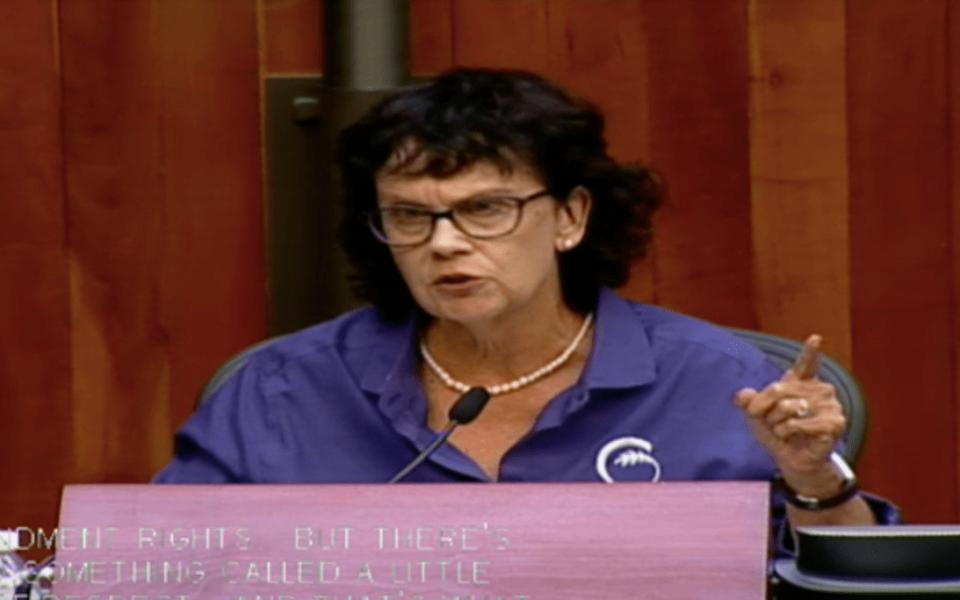In 2013, journalist Eric Ginsburg obtained a trove of emails that revealed that Councilwoman Marikay Abuzuaiter served as a confidential informant for the Greensboro Police Department. (In 2014, Ginsburg would help found Triad City Beat; he now works as a freelancer in New York City.)
Abuzuaiter vociferously denied it. And while the revelation cost her the trust of many progressive activist friends, her reputation with voters seems to have only prospered. She’s won three citywide elections since being outed. Which raises the question: Why not just own up to it?
During the most recent council meeting, on Oct. 2, several speakers called for the dismantlement of the police department’s controversial civil emergency unit, and a couple alluded to Abuzuaiter’s history with the department.
It’s hard to know where to start in unpacking Abuzuaiter’s denial and justification for her comportment.
“For me being called out — I took the citizen’s academy,” Abuzuaiter said. “You can call me anything you want to. But I want to say that I was at a rally, and I was at a rally where children were there. And there was a car that drove by — a van that drove by and stopped. And when that van drove and stopped and started throwing beer bottles at the children, I called the police. I dialed 911. I did it several times. Even when I was at rallies after — I had people telling me: ‘Are the police around in case that happens again?’ So yes, I developed a relationship with the police. But I was not the things that were called and that you’ve called out. I don’t think I’d be here if that were true.”
The fact is that the term “confidential informant,” or “CI,” used to describe Abuzuaiter comes straight from the police. A November 2009 email from Lt. Mike Richey to police employees Teresa Biffle, John D. Slone and Steven Kory Flowers begins with a phone number, and then Richey writes, “The number above is Marikay Abuzaiter [sic]. She was a frequent CI during the Palestinian protests. She called a few minutes ago to advise us that Tim Hopkins is planning a protest for 1530 ours [sic] at Market and Elm the day after Obama announces a troop buildup in Afghanistan.
“His surge protest in 2006 was the time we ended up arresting 11 when they tried to take over the street,” Richey continued. “You should have the intel report on your computer.
“Marikay said you can call her, just keep her involvement among us,” Richey concluded. “She was very reliable and hates Hopkins so there is plenty of motivation.”
About 20 emails obtained by Ginsburg show Abuzuaiter forwarding information to police employees about activist gatherings in 2010 and 2011, often with projections about which groups and individuals would participate and how many people organizers expected to show up.
Abuzuaiter’s anecdote about calling the police because she was in a protest that was attacked at least superficially would seem to have little to do her documented role as a CI.
The problem with her explanation is that it implies an obligation on the part of citizens to provide something of value to police in return for their service. Of course, anyone who is being assaulted with beer bottles should feel free to call the police for protection. But beyond thanking the officers for their assistance, the use of police services doesn’t need to be turned into a transaction. As public servants, their salaries are paid for through taxes paid by property owners and residents. What about those who don’t want to share information about their friends’ First Amendment activities with the police? Are they less deserving of police protection?
Also, as an elected official, Abuzuaiter should be the one holding the police accountable on behalf of the public, not someone who needs to ply the police with intelligence to “earn” protection.
Join the First Amendment Society, a membership that goes directly to funding TCB‘s newsroom.
We believe that reporting can save the world.
The TCB First Amendment Society recognizes the vital role of a free, unfettered press with a bundling of local experiences designed to build community, and unique engagements with our newsroom that will help you understand, and shape, local journalism’s critical role in uplifting the people in our cities.
All revenue goes directly into the newsroom as reporters’ salaries and freelance commissions.


Leave a Reply